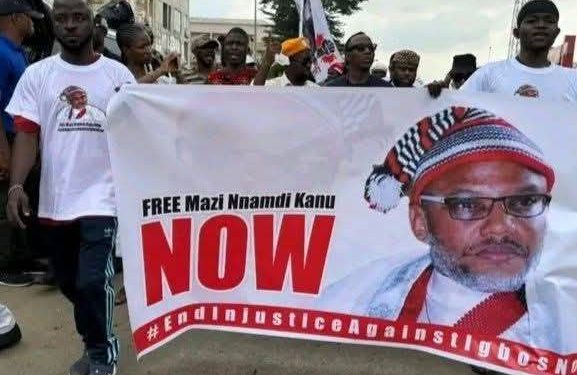Abuja witnessed heavy protests on Monday as thousands of demonstrators flooded major streets, demanding the immediate release of detained IPOB leader, Nnamdi Kanu. The demonstration, which caused gridlock across several parts of the Federal Capital Territory, was led by human rights activist Omoyele Sowore alongside other activists and members of various civil society organizations.
The protesters, who converged at Eagle Square, chanted slogans such as “Free Nnamdi Kanu”, calling on the Federal Government to comply with previous court rulings ordering his release.
Nnamdi Kanu, the leader of the Indigenous People of Biafra (IPOB), was first arrested in Lagos on October 14, 2015, and charged with treasonable felony over allegations of inciting violence in parts of South-Eastern Nigeria. He was granted bail in 2017 but allegedly jumped bail and fled the country after a reported military raid on his residence. His bail was later revoked in March 2019.
In 2021, Kanu was rearrested in Kenya and extradited to Nigeria, where he has since remained in detention under the custody of the Department of State Services (DSS). Despite multiple court rulings ordering his release, the government has continued to hold him, prompting ongoing debates about the fairness and integrity of Nigeria’s judicial system.
The latest protest was said to have started around 8 a.m. but was reportedly disrupted by police officers, leading to several arrests including that of Kanu’s lawyer, Barrister Aloy Ejimakor.
Recent reports of Kanu’s deteriorating health and alleged denial of medical care by authorities have reignited public outrage. Many Nigerians have questioned the government’s stance, contrasting Kanu’s prolonged detention with the perceived leniency shown to armed groups and bandits who have openly granted interviews while remaining unapprehended.
Analysts describe the development as a double standard that not only raises questions about the equity of justice in Nigeria but also risks sending a troubling message to the international community regarding the country’s commitment to rule of law and human rights.
“Free Nnamdi Kanu” Protest Heats Up Abuja
0
Leave a Reply Cancel reply
FOLLOW US
BROWSE BY CATEGORIES
BROWSE BY TOPICS
2023 Benue Budget
Abuja-Kaduna Rail
Access Corporation
Access pension
airports concession
Aviation
Ayu
Benue Budget
Benue Community
Buhari
Business
CBN
Central Bank
Dana Air
Economy
FGPL
Herdsmen
Herdsmen attacks
insecurity
insurance
Maritime
Min of Transport
MSMEs
NAICOM
NCAA
Nigeria
Nigeria -Cameroon Border Post
Nigeria Air
NRac
Onne Port
ooh
Orrom
Ortom
PDP
PenCom
pension
Railway
Sambo Jaji
Transcorp
Transcorp Group
Transcorp Hotels Plc
UBA
Ukohol
Wike
Wildon Ideva
Economy Footprint
The EconomyFootprint is published by Ideas Tent Communications Ltd®. All Rights Reserved.
Recent News
Contribute Towards Improving Education, NYSC DG Corps Members
December 2, 2025
Tinubu Nominates General Musa As New Defence Minister
December 2, 2025













